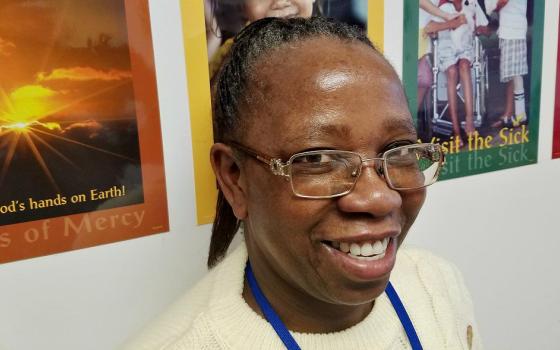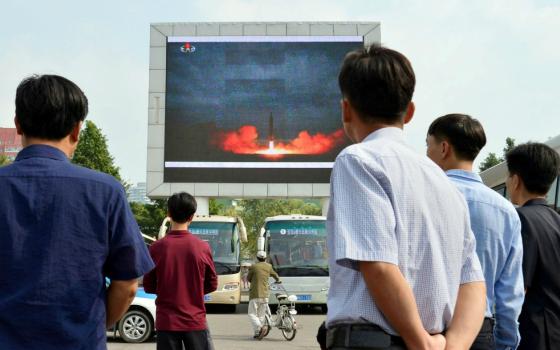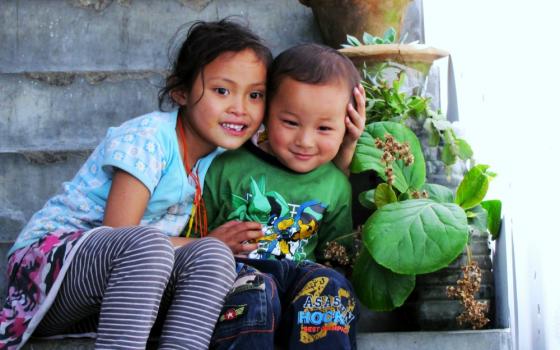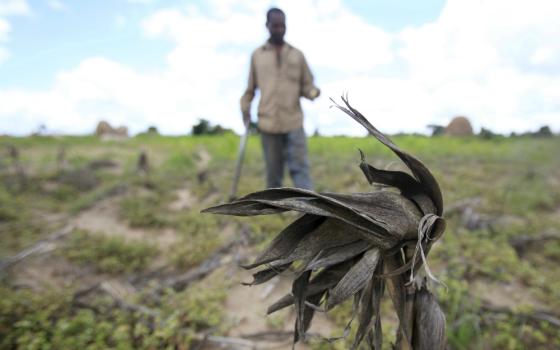Maryknoll Sr. Elizabeth Zwareva is a Zimbabwean who works at the Maryknoll Office for Global Concerns at the United Nations in New York. The office represents Maryknoll Sisters, Maryknoll Fathers and Brothers, and Maryknoll Lay Missioners in the debates at the U.N. on issues of peace, development and social justice.
Zwareva, 64, has been a Maryknoll sister for 33 years. For 26 of those years, she worked in Bolivia with a focus on women and health education. She also did pastoral ministry and worked with the Institute of Bioethics of the Catholic University of Bolivia.
"This work was very much related to the peace and justice work that I am doing now in that we advocated for the sick, the poor and marginalized people of Bolivia," Zwareva said.
A key part of Zwareva's ministry at the U.N. has been focused on nuclear disarmament — an issue that was long dormant but has become more prominent this year, partly because of ongoing tensions between the United States and North Korea over North Korea's nuclear testing.
Advocates against nuclear weapons, like Zwareva, scored a major victory in July, when 122 U.N. member states signed an agreement that outlaws nuclear weapons. She and other advocates say they know they are playing "a long game" and that the recent U.N. decision is, as she says, just a beginning. She has called the U.N. action "exciting" but said, "Now we must mobilize those in countries that did not sign the agreement." That includes the United States and other nuclear states.
Given the current tensions between the United States and North Korea, Global Sisters Report asked Zwareva for her thoughts not only about the current conflict but also about broader peace-related issues.
GSR: As someone involved at the U.N. on anti-nuclear efforts, and looking at the tensions on the Korean peninsula, how do chances for peace look now in that part of the world?
Zwareva: These are volatile times and, as such, it is difficult to foresee what will take place in the Korean Peninsula. The power plays between the U.S. and North Korea have, according to my opinion, revived the Cold War. Chances for peace are rather slim, given the animosities between the two countries. As we discuss this, wars are raging in the hearts of the leaders of the countries in question, and these are nothing but power plays.
The most frightening part of it is that these ideological wars involve the building and upgrading of nuclear weapons on both sides. Prospects for peace could be achieved through diplomacy and a sincere desire on both sides to build peace for the good of all humanity as well as for the well-being of planet Earth. I strongly believe that both leaders must give up egoistic thinking in order to give peace a chance.
Peace could also be achieved if the United Nations member states could come together and agree to weaken, cut and eliminate the supplies to the nuclear weapons industry.
Though it has only been less than two months since the U.N. disarmament vote, how does that figure into long-term efforts to achieve peace in the world?
Two months ago, U.N. member states voted to ban nuclear weapons, and this month, the Nuclear Ban Treaty will be open for ratification. This is a hopeful sign that those member states that ratified the treaty will honor their word and will, through their actions, contribute to reducing the potential for further developments in the nuclear weapons arena.
It is important to note that the manufacture of nuclear weapons depends upon the supply of raw materials from countries other than those that possess nuclear weapons. The cumulative effect of every little action that each country that ratifies the treaty contributes will add up and, in the long run, will help dismantle the nuclear weapons infrastructure.
These actions require strong convictions and moral commitments on the part of the member states that are willing to risk economic gain for the good of all humanity. This is not an easy task, but it can be achieved one step at time — although in truth, we are running out of time.
Let's take another look at peace without the immediacy of current events. When do you think wars can end?
This is a philosophical question that requires envisioning a world without nuclear weapons, without any weapons at all, including ideological ones. Human persons are creatures who have been gifted with reason and the capacity to make choices. If we humans decide to break down all the barriers that separate us from one another and to see ourselves as intricately connected to one another, to the environment and to all of creation, we will have gone one step toward an end to all wars.
We are called to union with God, and that union cannot happen at the superficial level. We must dig deep into our souls, into the source of all being who is God in order for all wars to end.
This might sound idealistic, but I think there are small circles that already live in peace and where there are no wars. For example, the kingdom of Bhutan uses happiness as a measure for its development policies. In order to achieve happiness, one has to be in touch with one's spiritual self and its connectedness to others.
To me, the concept of using happiness as a measure for development has to consider the material world as a means toward an end, and that end is happiness. One who is happy does not need weapons. So, when egoism ends, wars too will end.
I know some will say Catholic sisters have their hearts in the right place, but we have to be realistic about war, and countries will always fight wars. How do you respond?
In this question, I have a hard time with the word always. While differences can be accepted as a part of life, wars cannot be accepted as a given because there is a constructive way to resolve conflict between two people, groups and nations that does not always result in war.
I do not think that anyone in their right senses would choose war rather than a peaceful resolution of conflict except those who lack creativity or do not possess the patience needed to try and come to an understanding. The time to demonstrate physical prowess is a thing of the past because, today, diplomacy can resolve most frictions among nations.
That is why we sisters advocate for peace and nonviolence. There is no reason why countries ought to engage in war except in the face of failed diplomacy.
What elements are needed for peace?
The United Nations Charter upholds the principles of peace and justice and international law as the means toward the prevention and removal of threats to peace and security. When we look closely, the bellicose attitudes reflect deep fear that is masked as power. Therefore, the element of trust and collaboration will forge friendships between nations. These are the conditions that will promote peace, security and prosperity for all.
It is also important to look beyond physical, national or territorial differences and to see us as members of one human family, members of what I call the "one Earth community."
What current challenges on your home continent of Africa make peacemaking there difficult?
Africa is rich in resources, but many of the countries, including my own country, are experiencing difficulties because of profound inequalities that have undermined the peace and security that I experienced in my youth. At that time, climate change was unknown to us, and we had enough to eat.
My country was the breadbasket of the continent, but today my people are suffering from hunger, poverty and want, just as many other countries in Africa. People work hard, but the land no longer yields sufficient harvest to sustain families because of changing weather patterns. Political unrest and economic instability have added to insecurity.
Many young people are highly educated, but they are unemployed, underemployed or become street vendors. Some young people migrate in search of jobs while others resort to criminal activities or instigate violence because they cannot find jobs.
The solution to these problems is to provide employment for youth and to close the inequality gap. I think that closing the inequality gap would solve the escalating civil wars and unrest that have caused instability within some African countries.
What is next for those of you involved in anti-nuclear activism at the U.N.?
Our role is to keep being the voice of present and future generations whose lives will be affected if indeed any wars should be fought or should any nuclear bomb strike any of our cities. The time is now, because with nuclear weapons, there is no strategic response that can save us.
[Chris Herlinger is GSR international correspondent. His email address is cherlinger@ncronline.org.]




